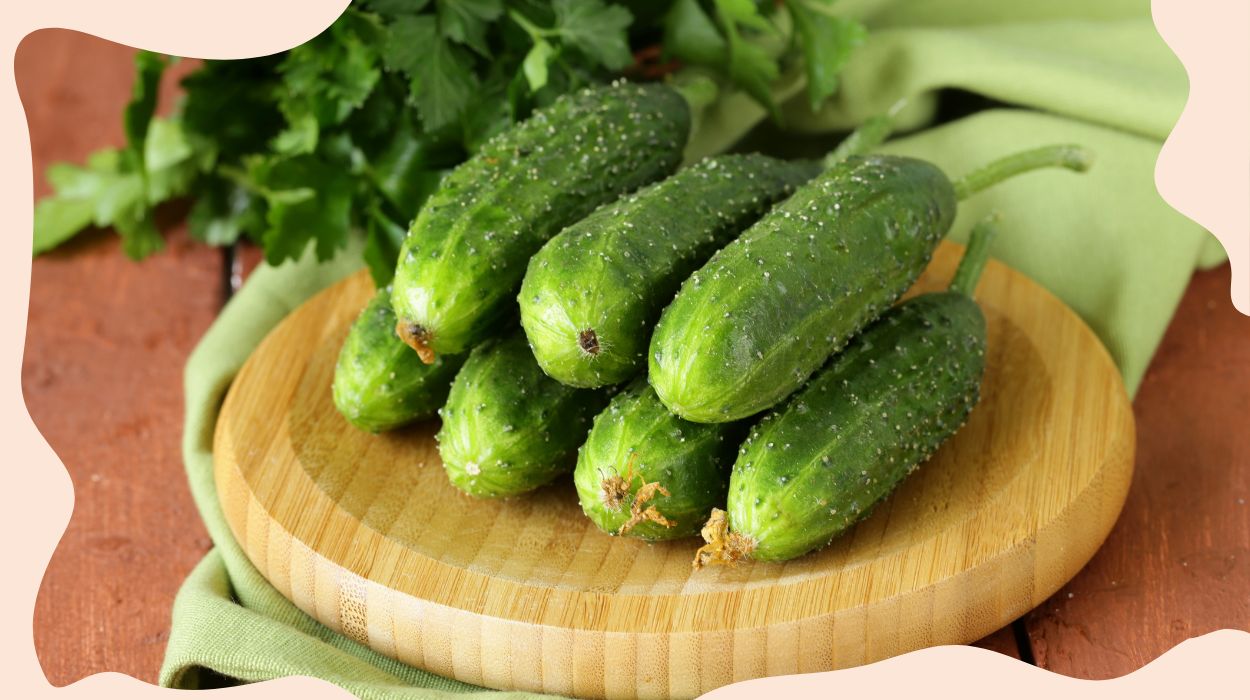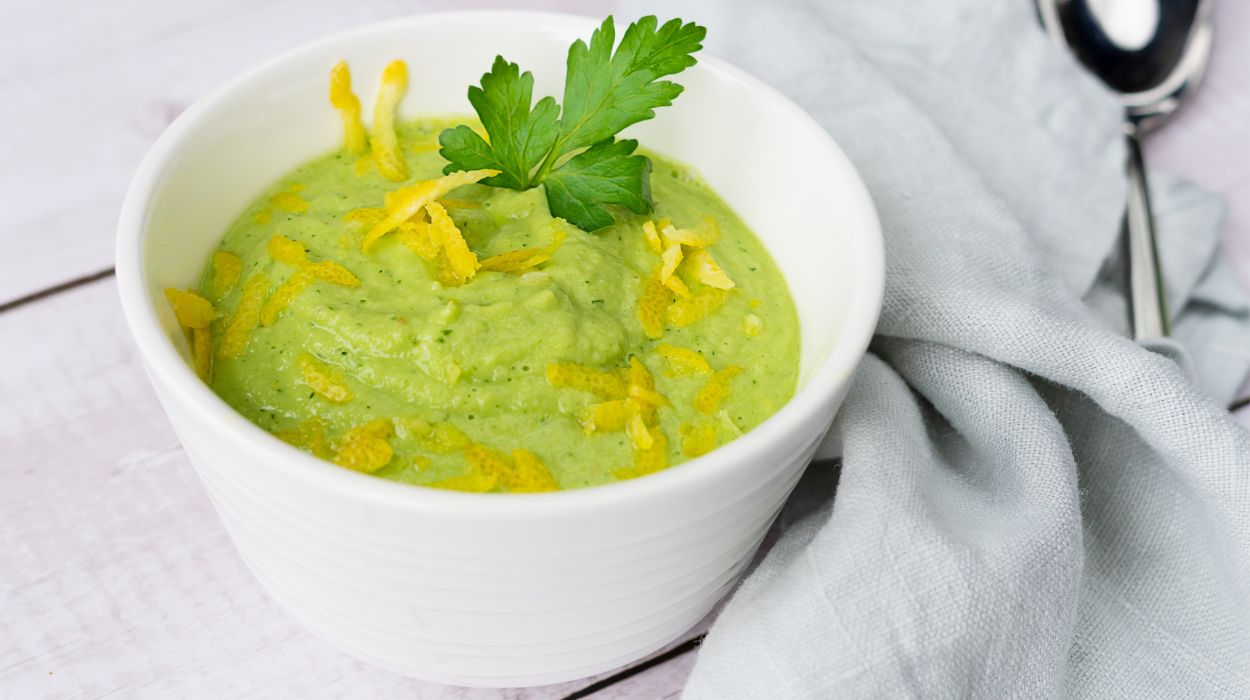Is Cucumber Good For Diabetes? Pros & Cons In 2024

Cucumber is a common vegetable offering various health benefits, but is cucumber good for diabetes? Assessing the suitability of cucumbers within a well-balanced diet for individuals with diabetes is crucial for effective blood sugar control.
Let’s explore the potential benefits of cucumber for those with diabetes and ways to incorporate cucumbers into a diabetes-friendly meal plan.
Is Cucumber Good For Diabetes?
Yes.
- Cucumbers have a low glycemic index, meaning they have a minimal impact on blood sugar levels. They contain a small amount of carbohydrates, mainly in the form of fiber, which can help regulate blood sugar levels.
- Cucumbers are rich in water content, which helps with hydration and can aid in maintaining stable blood sugar levels.
- Cucumbers are also a good source of dietary fiber, which can slow down digestion and the absorption of carbohydrates, leading to better blood sugar control.
Nutritional Value Of Cucumbers
It is important to understand the nutritional composition of cucumbers when considering how they can contribute to a diabetes-friendly healthy diet.
Cucumbers are low in calories and carbohydrates, making them a favorable choice for people who have diabetes. With their high water content and nutrient profile, they can be a valuable addition to your list of foods for diabetes.
Key nutrients[1] per 100 grams of cucumber are:
- Calories: 15 kcal.
- Total fat: 0.11 g.
- Sodium: 2 mg.
- Total carbohydrate: 3.63 g.
- Protein: 0.65 g.
Cucumbers are rich in various vitamins and minerals, including:
- Calcium: 16 mg.
- Vitamin C: 2.8 mg.
- Iron: 0.28 mg.
- Magnesium: 13 mg.
- Potassium: 147 mg.
Cucumbers provide other essential nutrients, including vitamin K, molybdenum, vitamin B5, copper, manganese, phosphorus, and biotin.
Cucumbers also contain silicon,[2] a trace mineral in the strengthening of connective[3] tissues like skin, hair, and nails.
Cucumbers also contain bioactive nutrients which may benefit the skin, such as soothing burns[4] such as sunburn[5] when used topically.
Glycemic Index Of Cucumber
The glycemic index[6] – or GI – is a measure of how quickly and significantly a food affects blood sugar levels or blood glucose. Foods with a high GI tend to cause a rapid increase in blood sugar, while those with a low GI have a more gradual and smaller impact.
Cucumbers have a low GI, with a value of 15.[7] Foods with a GI value less than 55 are considered low[8] GI, indicating that they cause a slower and more stable rise in blood glucose.
How Cucumbers Affect Diabetes
Cucumbers have a low GI, which helps keep glucose levels balanced. Their high fiber content may help regulate blood sugar levels[9] by slowing digestion, leading to a gradual absorption of glucose into the bloodstream.
Dietary fiber also increases post-meal fullness, aiding weight loss.[10] Weight loss is critical for diabetes management.[11]
Cucumbers contain antioxidants like vitamin C, which fight inflammation and protect against diabetes-related risks, such as cardiovascular disease.[12] Vitamin C may also aid blood sugar control.
Finally, cucumbers are high in water and can provide hydration,[13] which is crucial for those managing diabetes.
Benefits Of Cucumber For Diabetes
Cucumbers offer a multitude of benefits that can aid in regulating glucose levels and promoting overall well-being.
Provides Dietary Fiber
Cucumbers are packed with dietary fiber,[9] which plays a vital role in diabetes management.
Fiber slows digestion, preventing sudden spikes in blood sugar levels. It also promotes a feeling of fullness, helping individuals with diabetes manage their appetite and portion sizes.
High In Antioxidants
Cucumbers contain antioxidants[14] that can be beneficial for diabetes. These antioxidants inhibit oxidative damage and inflammation, helping to combat the harmful effects of free radicals in the body.
Supports Insulin Activity
Cucumbers, with their low carbohydrate and calorie content, may offer potential benefits for individuals with diabetes[15] by supporting insulin activity. While more research is needed, the high water and fiber content in cucumbers can aid in regulating blood sugar levels and promoting satiety.
May Improve Weight Management
Cucumbers are low-calorie[4] and high in water, which might help reduce calorie intake and aid weight loss.[16]
The fiber may also help digestion and promote regular bowel movements.[17] As constipation is linked to obesity,[18] this may support healthy weight management goals for people with diabetes.
May Improve Blood Sugar Balance And Blood Pressure
The fiber, antioxidants, and high water content of cucumbers contribute to lowering blood sugar and blood pressure.[19] However, we still need more evidence for these health effects of eating cucumbers.
Improves Hydration
Staying hydrated is crucial for everyone, especially those with diabetes. Consume cucumbers as a refreshing and hydrating snack option. Slicing cucumbers and putting them in water also makes a refreshing flavored beverage! Furthermore, when you eat cucumbers, not only do they improve hydration, but their low glycemic index helps to moderate blood sugar levels.
Side Effects
While cucumbers are generally celebrated for their health benefits, it is important to be aware of potential side effects and considerations when incorporating them into a diabetes management plan.
Allergic Reactions
While rare, cucumbers can trigger allergic reactions[20] in some individuals. Allergies can range from mild symptoms like itchiness and swelling to more severe reactions. If you encounter any unusual symptoms after eating cucumbers, it is wise to seek immediate medical attention.
Medication Interactions
Cucumbers may lower blood sugar levels, which might cause your blood glucose to become too low if combined with diabetes medications. Consult your healthcare provider for personalized advice tailored to your medication regimen.
Cucumber Healthy Dishes For Diabetes
Here are some unique cucumber recipes that are refreshing and suitable for people with diabetes:
CRISP CUCUMBER AND MINT QUINOA SALAD

Ingredients
- Cooked quinoa.
- Thinly sliced cucumber.
- Freshly chopped mint leaves.
- Zesty lemon dressing.
- Extra virgin olive oil.
- A hint of salt and pepper.
Instructions
- In a mixing bowl, combine the cooked quinoa, thinly sliced cucumber, and freshly chopped mint leaves.
- Drizzle the zesty lemon dressing and a drizzle of extra virgin olive oil over the salad.
- Toss the ingredients until well combined.
- Add salt and pepper to taste.
- Allow the salad to chill in the refrigerator.
CREAMY CUCUMBER AND AVOCADO SOUP

Ingredients
- Fresh cucumbers, peeled and roughly chopped.
- Avocado, ripe and pitted.
- Greek yogurt.
- Fresh herbs.
- Lime juice.
- A touch of minced garlic.
- Seasonings to taste.
Instructions
- Blend the fresh cucumbers, avocado, and Greek yogurt until smooth and creamy.
- Add fresh herbs, lime juice, and a touch of minced garlic.
- Adjust the seasonings according to your taste preferences.
- Chill the soup in the refrigerator.
The Takeaway
Cucumbers can be a beneficial addition to the diet of people living with diabetes.
Cucumbers may contribute to blood sugar control, weight management, and overall health with their low GI, high fiber content, and hydrating properties. However, more research is needed to confirm cucumber’s blood sugar-lowering effects.
Nevertheless, including cucumbers in meals and snacks can provide a refreshing and nutritious option that supports a balanced diabetes management plan.
Frequently Asked Questions
Lemon and cucumber water can be beneficial for diabetes as it provides hydration and nutrients.
Cucumber water can provide hydration for people with diabetes. It is low in calories and carbohydrates, making it a suitable option for reducing blood sugar levels.
Cucumber has a low GI and contains fiber, which can help regulate blood glucose levels. But this does not guarantee it as a standalone treatment for diabetes, and its impact may vary among individuals.
Pickles can be included in moderation as part of a diabetes-friendly diet, but choose pickles with low sugar content and monitor overall carbohydrate intake.
Cucumber smoothies can be a healthy choice for individuals with diabetes if prepared with low-sugar ingredients and balanced with protein and healthy fats to prevent rapid blood sugar fluctuations.
Yes, people with diabetes can enjoy cucumber salad as it is low in carbohydrates and calories. It can be a refreshing and nutritious addition to a balanced meal plan.
Sipping on cucumber juice can benefit individuals with diabetes, but moderation is key. Remember to keep an eye on the carbohydrate content and monitor blood glucose levels accordingly.
Cucumber is low in carbohydrates and has a low GI, so it is unlikely to contribute to insulin resistance. Some research suggests cucumbers might even lower blood sugar levels.
+ 20 sources
Health Canal avoids using tertiary references. We have strict sourcing guidelines and rely on peer-reviewed studies, academic researches from medical associations and institutions. To ensure the accuracy of articles in Health Canal, you can read more about the editorial process here
- Usda.gov. (2023). FoodData Central. [online] Available at: https://fdc.nal.usda.gov/fdc-app.html#/food-details/168409/nutrients.
- Tripathi, D., Mrigank Mauli Dwivedi, Durgesh Kumar Tripathi and Devendra Kumar Chauhan (2017). Silicon bioavailability in exocarp of Cucumis sativus Linn. [online] doi:https://doi.org/10.1007/s13205-017-0960-x.
- Silva, Flávia Alvim Sant’Anna Addor and Campos, M. (2016). Use of silicon for skin and hair care: an approach of chemical forms available and efficacy. [online] 91(3), pp.331–335. doi:https://doi.org/10.1590/abd1806-4841.20163986.
- Zakira Naureen, Kristjana Dhuli, Donato, K., Aquilanti, B., Velluti, V., Matera, G., Iaconelli, A. and Bertelli, M. (2022). Foods of the Mediterranean diet: citrus, cucumber and grape. [online] 63(2 Suppl 3), pp.E21–E27. doi:https://doi.org/10.15167/2421-4248/jpmh2022.63.2s3.2743.
- Mukherjee, P.K., Nema, N.K., Niladri Pratap Maity and Sarkar, B.K. (2013). Phytochemical and therapeutic potential of cucumber. [online] 84, pp.227–236. doi:https://doi.org/10.1016/j.fitote.2012.10.003.
- Ahmed, J., Riaz, M. and Imtiaz, R. (2021). Glycemic index and Glycemic load values. [online] 37(4). doi:https://doi.org/10.12669/pjms.37.4.4555.
- Sarvesh Sabarathinam (2023). A glycemic diet improves the understanding of glycemic control in diabetes patients during their follow-up. [online] 9(3). doi:https://doi.org/10.2144/fsoa-2022-0058.
- Chinedum Eleazu (2016). The concept of low glycemic index and glycemic load foods as panacea for type 2 diabetes mellitus; prospects, challenges and solutions. [online] 16(2), pp.468–468. doi:https://doi.org/10.4314/ahs.v16i2.15.
- Reynolds, A.G., Akerman, A.P. and Mann, J. (2020). Dietary fibre and whole grains in diabetes management: Systematic review and meta-analyses. [online] 17(3), pp.e1003053–e1003053. doi:https://doi.org/10.1371/journal.pmed.1003053.
- Miketinas, D., Bray, G.A., Beyl, R.A., Ryan, D.H., Sacks, F.M. and Champagne, C.M. (2019). Fiber Intake Predicts Weight Loss and Dietary Adherence in Adults Consuming Calorie-Restricted Diets: The POUNDS Lost (Preventing Overweight Using Novel Dietary Strategies) Study. [online] 149(10), pp.1742–1748. doi:https://doi.org/10.1093/jn/nxz117.
- Hajira Dambha-Miller, Day, A.M., Strelitz, J., Irving, G. and Griffin, S.J. (2019). Behaviour change, weight loss and remission of Type 2 diabetes: a community‐based prospective cohort study. [online] 37(4), pp.681–688. doi:https://doi.org/10.1111/dme.14122.
- Mason, S.A., Keske, M.A. and Wadley, G.D. (2021). Effects of Vitamin C Supplementation on Glycemic Control and Cardiovascular Risk Factors in People With Type 2 Diabetes: A GRADE-Assessed Systematic Review and Meta-analysis of Randomized Controlled Trials. [online] 44(2), pp.618–630. doi:https://doi.org/10.2337/dc20-1893.
- Kalra, S., Kalra, S., Agrawal, N. and Kapoor, N. (2023). Water and Diabetes: Prevention and Cure. [online] 73(2), pp.426–427. doi:https://doi.org/10.47391/jpma.11-23.
- Dal, S. and Sigrist, S. (2016). The Protective Effect of Antioxidants Consumption on Diabetes and Vascular Complications. [online] 4(4), pp.24–24. doi:https://doi.org/10.3390/diseases4030024.
- Huerta-Reyes, M., Tavera-Hernández, R., Alvarado-Sansininea, J.J. and Jiménez-Estrada, M. (2022). Selected Species of the Cucurbitaceae Family Used in Mexico for the Treatment of Diabetes Mellitus. [online] 27(11), pp.3440–3440. doi:https://doi.org/10.3390/molecules27113440.
- Liska, D., Mah, E., Brisbois, T.D., Barrios, P., Baker, L.B. and Spriet, L.L. (2019). Narrative Review of Hydration and Selected Health Outcomes in the General Population. [online] 11(1), pp.70–70. doi:https://doi.org/10.3390/nu11010070.
- Aziz, I., Whitehead, W.E., Palsson, O.S., Törnblom, H. and Magnus Simren (2020). An approach to the diagnosis and management of Rome IV functional disorders of chronic constipation. [online] 14(1), pp.39–46. doi:https://doi.org/10.1080/17474124.2020.1708718.
- Erika Aparecida Silveira, Silva, Jessivane Nascimento Ribeiro, Noll, M., Paula, A. and Cesar de Oliveira (2021). Prevalence of constipation in adults with obesity class II and III and associated factors. [online] 21(1). doi:https://doi.org/10.1186/s12876-021-01806-5.
- S. Vimala, P. Mangalagowri, Ali, M., Nivetha, Amutha and Banupriya (2018). Effectiveness of Cucumber in reduction of Blood Pressure among hypertensive clients in selected Rural Area. [online] 11(7), pp.2914–2914. doi:https://doi.org/10.5958/0974-360x.2018.00537.1.
- Worm, M., Jappe, U., Jörg Kleine-Tebbe, Schäfer, C., Reese, I., Joachim Saloga, Treudler, R., Zuberbier, T., Waßmann, A., Fuchs, T., Dölle, S., Raithel, M., Ballmer-Weber, B., Niggemann, B. and Werfel, T. (2014). Food allergies resulting from immunological cross-reactivity with inhalant allergens. [online] 23(1), pp.1–16. doi:https://doi.org/10.1007/s40629-014-0004-6.



